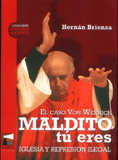
The Argentine Inquisitor
Christian Federico von Wernich, who was born in 1938 and who is of German origin, became chaplain of the Buenos Aires Provincial Police in 1976. Von Wernich is accused of having abused his position in the clergy in order to obtain information from political prisoners during confession.
One of the most atrocious crimes in which von Wernich is said to have participated was that of the "group of seven" (Grupo de los siete) students, who he allegedly �broke� through confession and who were later killed. It is alleged that he often visited the relatives of the seven students asking for money and telling them that their children were going to be released soon if they cooperated. He allegedly promised the same to the students, as in the case Cecilia Idiart, who later was killed.
The report �Nunca M�s� ("Never Again") produced by the National Commission on the Disappeared (CONADEP), contains important information about the role played by von Wernich during the repression and about his alleged complicity with torture and arbitrary detention. The report reproduces several testimonies implicating the clergy. An Argentinean official, for instance, who had taken part in the killing of a member of the opposition in the presence of Von Wernich later testified: �Father Von Wernich saw that what had happened had shocked me, and spoke to me telling me that what we had done was necessary; it was a patriotic act and God knew it was for the good of the country. �
After the dictatorship von Wernich was sent by the church to the Parish of 9 July some 250 kilometers from Buenos Aires where he remained until 1996. After that, he moved to Chile where he worked as a priest in El Quisco under the false name of Cristian Gonzalez.
In 2003, he was located there by Hernan Brienza, a journalist who was investigating his involvement in the crimes and who authored "Maldito tu eres", a book about the link of von Wernich with the repressive regime in Argentina. As a consequence, in May 2003, von Wernich laid down his sacerdotal functions.
Von Wernich was arrested in 2003, after the Constitutional Court declared unconstitutional the Amnesty Law (�Ley de Punto Final�) and the Due Obedience Law (�Ley de Obediencia debida�).
Von Wernich was arrested in 2003. He is currently under investigation in two different criminal procedures, both of which are conducted by Judge Arnaldo Corazza from La Plata. In 2003, as part of the first procedure, he was put under preventive detention for his possible involvement in 33 arbitrary detentions and 19 arbitrary killings.
On 29 December 2005, as part of the second procedure, judge Corazza also arraigned him on charges concerning 20 other cases of serious human rights violations: 12 cases of arbitrary detention and 8 cases of torture in the clandestine centres of detention of "Puesto Vasco", "Destacamento de Arana", "Coti Martinez" and "Pozo de Quilmes". This later process is known as "Camps II", in the course of which several other persons are being investigated and or have been detained, too.
The judge held that von Wernich�s visits in the detention center �formed part of a disastrous machinery aimed at the violation of the personal liberty and the humiliation of the persons who were illegally detained�.
Twenty former military personnel are being held in Argentina for crimes committed within the framework of the �Condor� plan. The total number of soldiers in detention and charged under Argentinean law for human rights violations, amounts to 120, to which should be added two Argentineans held in Spain. Some of these proceedings concern children forcibly taken away at birth from their mothers who had been imprisoned for political reasons. In the estimation of the judges, this crime was never covered by the amnesty law. Source: Le Monde, January 5, 2005
On 14 June 2005, the Argentinean Supreme Court declared unconstitutional, 7 votes in favour, 1 against and 1 abstention, the Amnesty Law � �Ley de Punto Final�; Ley 23.492- and the Due Obedience Law � �Ley de Obediencia debida�; Ley 23.521- sanctioned by President Alfonsin in 1987. The Court maintained that those laws violated article 75, paragraph 22 of the 1994 Argentinean Constitution, which gives constitutional status to the International Covenant on Civil and Political Rights, to the Genocide Convention, to the Torture Convention and to the Inter-American Convention, among others. According to the Court, following diverse decisions by the Inter-American Court and by other international bodies, the State has an obligation to investigate, prosecute and punish those who have committed violations of the right to life, to humane treatment or who have engaged in disappearances, obligation which cannot be limited or abolished by the enactment of an Amnesty or Due Obedience Laws as ruled by the Inter-American Court in the case of Barrios Altos v. Peru.
This historical decision allows the domestic or international investigation, prosecution and punishment of members of the military suspected to have taken part in the torture, disappearance and/or killings of more than 30,000 persons in Argentina between 1976 and 1983.On September 20, 2006, in the course of the trial of Miguel Etchecolatz, the court for the town of La Plata used the term "genocide" for the crimes committed by the military dictatorship (1976-1983). It was the first time these crimes were qualified as genocide by a court, just like human rights organisations had long argued they should be. This legal qualification is now contained in the judgment against former police officer Etchecolatz, who was sentenced to life imprisonment for torture, murder and abduction of opponents of the regime.
The court emphasized that the crimes were committed in the context of a genocide campaign organised by the state. For future procedures against former members of the police force and the military, this view could be of crucial importance.
From: Trial Watch
See Google for much more information in Spanish. [Ed.]
